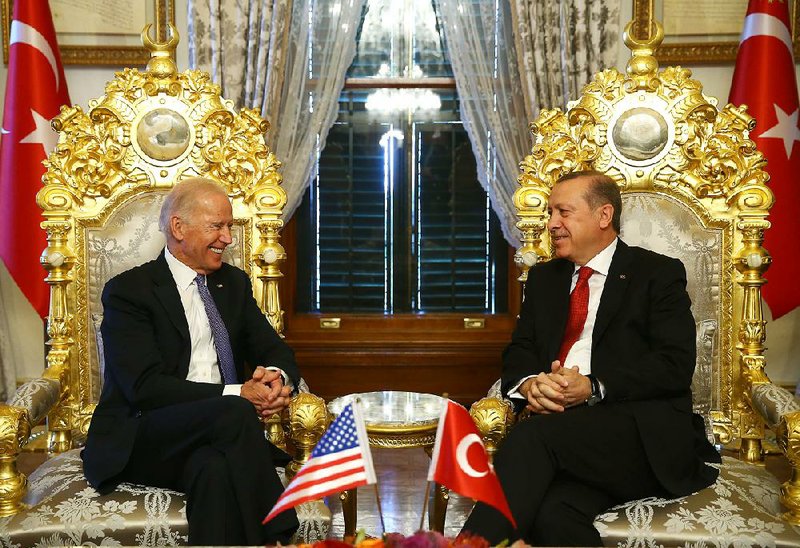ISTANBUL -- Turkey and the United States agree on the need to ramp up support for Sunni Arab forces in Syria to cut off the Islamic State group's access to the Turkish border and to prevent future terror attacks, U.S. Vice President Joe Biden said Saturday.
Speaking during a joint news conference with Turkish Prime Minister Ahmet Davutoglu, Biden said cutting off that access is "a priority for both of our nations, so that we can prevent new fighters and equipment from reaching [the Islamic State] and conducting attacks against civilians."
He also met with Turkish President Recep Tayyip Erdogan, capping a two-day visit to Istanbul focused on boosting the fight against Islamic State militants and resolving the crisis in Syria.
Biden also offered his condolences over a Jan. 12 terror attack that killed 12 German tourists in Istanbul. The Turkish authorities say the suicide bomber was linked to the Islamic State.
"We have a robust operation and commitment to defeat [the Islamic State]," said Biden, crediting Turkey for increasing efforts to secure its 550-mile border with Syria, as well as allowing anti-Islamic State coalition aircraft to use Turkish bases for bombing runs against Islamic State targets.
Biden also acknowledged the threat that Kurdish militants pose to Turkey, calling the PKK, or Kurdistan Workers' Party, "a terrorist group plain and simple." Ankara views its war on terror as a two-prong effort focused on Kurdish militants and Islamic State jihadists who have established cells in Turkey and use the country as a gateway to Syria.
But while saying ties with the United States are strong, Davutoglu repeatedly referred to the Syrian group -- called the People's Protection Units and known by its Arabic initials as the YPG -- as a terrorist organization on par with the Islamic State and as a component part of Turkey's own Kurdish militants, who have long used violence to try to carve out their own state inside the Turkish border.
"We shared this vision" with Biden, Davutoglu said. "It's good to see we're on the same page."
Biden, standing beside Davutoglu as the two delivered statements without fielding questions, agreed that the Turkish Kurdistan Workers Party is a terrorist group and has been labeled as such by the U.S. government. But he never mentioned the Syrian Kurds.
"We want to make sure, in such an important relationship, that there's no misunderstanding," Biden said. "Where we are in agreement, we agree with precision. Where we have disagreement, we state it flatly." On strategic issues, including the need to work together to defeat the Islamic State, he said, "there is no disagreement."
The status of the Syrian Kurds has become a sticking point in U.S.-Turkey collaboration in the fight against the Islamic State, and in the coming negotiations between Syrian President Bashar Assad's regime and Syrian opposition forces fighting against it.
The negotiations, that were set to begin Monday in Geneva, now appear to have been postponed, at least until later in the week.
As much of the Syrian opposition has turned its attention to Assad, the United States has found the Kurds among the only available forces, and one of the most capable, to fight against the Islamic State on the ground as U.S. airstrikes pummel the militants.
Meanwhile, Russia, which along with the United States is shepherding the Assad-opposition negotiations, is at odds with Turkey and has insisted that the People's Protection Units, as a potent force in Syria, be included as part of the opposition delegation. The rest of the opposition has refused, and Turkey has said it will withdraw its support for the talks.
Biden also said that as the administration official with the most experience dealing with Iraqi Prime Minister Haider al-Abadi, he hoped to settle a related dispute between Iraq and Turkey.
Turkey has increased its troop presence in northern Iraq near the Turkish border, where it is training Iraqi Kurdish forces, in what Iraq charges is an attempt to take action against the Kurdistan Workers' Party, whose guerrilla camps are located nearby.
Calling it a violation of Iraqi sovereignty, al-Abadi has demanded that the Turks withdraw, and has threatened to invite Russia in to bomb them. Since September, Russia has been using airstrikes against anti-Assad forces in Syria.
"I'm self-appointed to see if I can work out something between my good friend, the prime minister of Turkey, and my good friend, the prime minister of Iraq, to see if we can work out a modus vivendi on the same page," Biden said.
Information for this article was contributed by Dominique Soguel of The Associated Press; and by Karen DeYoung of The Washington Post.
A Section on 01/24/2016

